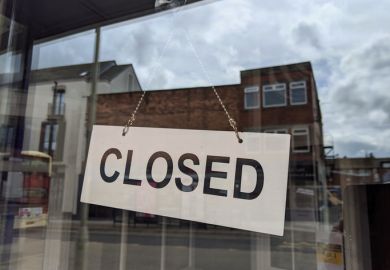Source: Reuters
Slow the flow: after a stuttering start, the drive to get UK universities’ money out of the petroleum pipeline has been gaining momentum recently
Just six months have passed since UK universities’ efforts to divest from the fossil fuel industry were condemned as disappointingly slow-moving by a leading climate change campaigner.
How times have changed. The University of Glasgow’s decision last year to become the first European higher education institution to relinquish its investments in the sector – subject to financial analysis, which is due to be debated next month – appears to have triggered a domino effect across UK academia.
The University of Bedfordshire and Soas, University of London have announced their own plans to divest, while the London School of Hygiene and Tropical Medicine has decided to pull out of coal.
Glasgow’s decision also appears to have energised the campaign for divestment, with People & Planet, the student-led movement that is campaigning for universities to go “fossil free”, reporting a “massive surge of interest” on campus.
This could be the month when the campaign really takes off, with the University of Edinburgh due to make a decision on divestment as Times Higher Education went to press and the University of Oxford debating its position later in the month.
However, there is still a long way to go before it can be said that the movement has significantly altered the university investment landscape.
People & Planet says that the total value of UK higher education investment in fossil fuels is about £1.9 billion, and that is a conservative estimate: the real total may be as high as £5.2 billion, the group claims.
Nevertheless, Bill McKibben, the US environmentalist and Schumann distinguished scholar at Middlebury College, Vermont, who not long ago was extremely critical of UK universities’ efforts, is heartened by recent events.
“Universities may not be the nimblest and fastest-moving of all institutions in our society, but once they get into gear, they eventually start to make real progress,” he said.
Campaigners hope that by persuading universities to divest from the industry, they will make it harder for fossil fuel companies to source and sell their products.
This case gets a sympathetic hearing from many in the higher education sector: few of its members question the need to tackle climate change urgently.
‘Gesture’ politics
However, there is by no means consensus about whether divestment is the best tactic for saving the planet.
David Macdonald, chair of geology and petroleum geology at the University of Aberdeen, acknowledges the need to change the planet’s energy mix, but he questions how effective targeting the world’s biggest private oil companies will prove when, according to the World Bank, 90 per cent of global oil reserves are held by national oil companies.
In Professor Macdonald’s experience, the private sector has proved much more effective than sovereign states in developing technologies that allow fossil fuels to be extracted more efficiently and cleanly.
“There’s a certain amount of posturing going on with this, and it is done by people who have very little understanding of how the global oil industry works,” he said.
Mike Hulme, professor of climate and culture at King’s College London, questions whether the divestment campaign is much more than a “gesture”: after all, it is “not as though the world is short of capital”.
He highlights that divestment does not distinguish between a coal extraction company that produces a lot of pollution and an oil or gas firm that is working hard to reduce its carbon dioxide emissions.
“There are many other investors that would very quickly line up to invest in these industries,” Professor Hulme said. “Many of these investors will have less of a social conscience than universities or charitable organisations, so you are handing over potential influence to alter the direction of these companies.”
Professor Hulme said that there was a risk that focusing so heavily on divestment gave a “false sense of success” that “you have somehow cracked climate change”, when, in his opinion, universities should be actively choosing to invest in more progressive fossil fuel companies as well as in renewable technologies.
Where we lead, others will follow
But Andrew Taylor, fossil free campaign manager for People & Planet, said that these criticisms took an overly simplistic view of divestment and its aims, and overlooked the “leadership” role that universities take in society.
Divestment, he said, is “a way that people from across society can offer a strong voice that they want action against climate change”.
Mr Taylor added: “Divesting isn’t saying we are switching from fossil fuels today, and the campaign isn’t about bankrupting the industry today, because we would be mad to want that to happen.
“But it is about breaking down the power of that industry and saying that we want a different future.”
‘Stranded assets’?
With university divestment from fossil fuels only just getting under way in the UK, its impact remains uncertain in another important area: institutions’ research relationships with an industry that funds projects and posts across the country.
It is likely to be a key area of debate given that Glasgow was forced to reassure staff and students last October that it remained “committed” to teaching and research in fossil fuels amid warnings that divestment would “jeopardise” its credibility in this area.
Mr Taylor said that he could not foresee the likes of BP pulling their research out of prestigious institutions such as the University of Oxford simply because of an investment decision.
And he argued that divestment would actually prove to be a good financial decision for universities – a view shared by Peter Michaelis, who works with higher education institutions as part of his responsibilities as head of equities at Alliance Trust Investments.
The need to leave so much of the world’s fossil fuel reserves in the ground for environmental reasons meant that investors buying stocks in the industry were at risk of being left with “stranded assets” of limited value, Mr Michaelis said.
“We think that universities should definitely be considering divestment, not just on ethical grounds or because students are agitating for it, but also on sensible long-term investment grounds,” he added.
“The idea that divestment means worse returns isn’t borne out by the evidence.”
Register to continue
Why register?
- Registration is free and only takes a moment
- Once registered, you can read 3 articles a month
- Sign up for our newsletter
Subscribe
Or subscribe for unlimited access to:
- Unlimited access to news, views, insights & reviews
- Digital editions
- Digital access to THE’s university and college rankings analysis
Already registered or a current subscriber?










